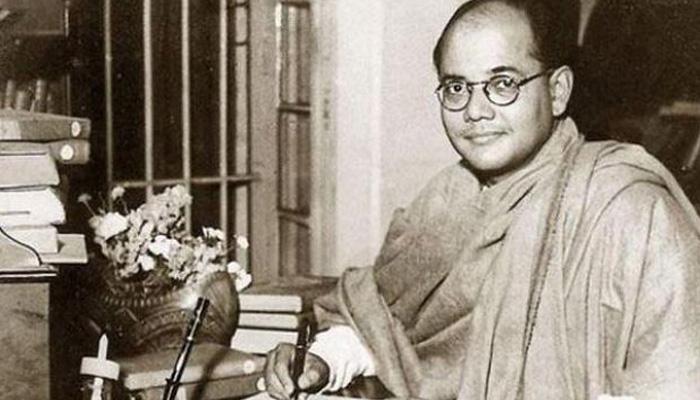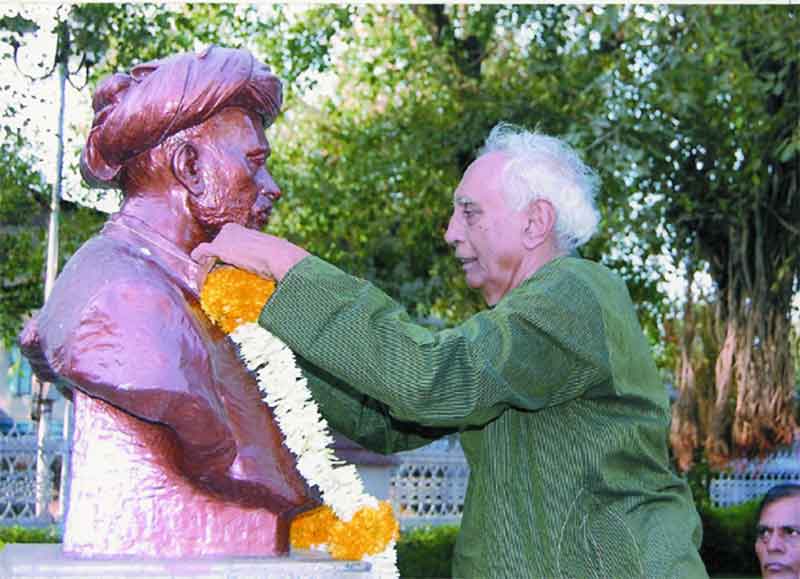
The freedom movement of India was known for its many-sided efforts to create a better society out of the ruins of the massive destruction caused by colonial rule. Hence many constructive activities and social reforms were pursued side by side with the struggles against colonialism. This included continuing efforts for inter-faith harmony by some of the most inspiring leaders of the freedom movement like Shahid Bhagat Singh, Mahatma Gandhi, Jawaharlal Nehru, Subhash Chandra Bose, Badshah Khan and Maulana Azad. When most of the real freedom leaders were jailed in the 1940s, the colonial rulers used their absence to deliberately push ahead divisive persons as leaders by extending a lot of opportunities and facilities to them resulting in the great tragedy of partition. Despite this, the inspiring efforts of great leaders of freedom movement for inter-faith harmony should continue to guide us.
As the country has just observed the birth anniversary of Netaji Subhash Bose on January 23, this is a good time to remember his deep commitment to inter-faith harmony which was very visible in the activities of the Indian National Army ( INA) which he mobilized to fight for the freedom of India. Another reason for remembering this now is that this important aspect of the commitments of Netaji and the INA, so important for unity and harmony, does not appear to be receiving the due attention in official discourse and celebrations.
From time to time several former members of the INA have recalled the great spirit of unity and harmony which existed among the soldiers of the INA so that several social practices, prejudices and and discriminations which were common in society at that time were easily overcome within the INA. This did not happen just like that. Subhash Bose took the lead in making this a very important part of the organizational effort.
He was well known for his understanding from earlier times that inter-faith harmony is a must for creating a better India and for strengthening the freedom movement, a fact emphasized a lot also by several other revolutionaries led by Shahid Bhagat Singh. In fact the legendary friendship of two revolutionaries Ramprasad Bismil and Ashfaqullah Khan became a symbol of inter-faith harmony. Subhash Bose carried this strength of the revolutionary freedom movement further and while creating an army in adverse conditions to fight colonial rule he made inter-faith unity one of the most important principles of the new force.
At this point we must pause to consider the criticism of Subhash Bose accepting the help of Germany and Japan in these efforts. However those who know the entire life and ideas of Subhash Bose know well that he could never be a part of Nazi and fascist thinking. He had left India to go not to Germany or Japan but to the USSR but could not make it and as there was no going back to India except to be jailed (and reduced to inactivity) by the colonial rulers, he reluctantly went to Germany.
Once there he was trapped by circumstances as either he had to entirely give up his vision of starting a new freedom struggle, ending up in a German jail instead of a British jail, or else he had to accept some German (and later Japanese) help. At that stage he was not aware also of the full extent of the absolutely horrible atrocities committed ultimately by the axis powers, or else he would not have accepted even this limited help. Also we should not forget that as Germany was frequently hostile to Britain and as Britain was the colonial power in India, for freedom fighters trying to escape being jailed in India and work for the freedom of India from abroad, Germany had long been one of the favored nations to operate from and this can partly explain the rather desperate decision of Subhash to instead go to Germany when he failed to make it to the USSR, being unaware at that stage also of the extent of the cruelty of the Nazi regime there and being all too aware of British cruelty in India which he had been seeing closely for so many years. Hence the acceptance of German and Japanese help at time was more of a historical accident as Subhash Bose found himself in situations over which he had little control and could not make entirely principle-based choices. Moreover his relationship with German and Japanese contacts was never one of complete cooperation and was of a very limited nature, to the extent that it could not be avoided under the circumstances by him. The fact that he continued to give the highest respect to Mahatma Gandhi and the mainstream freedom struggle, identifying closely with the Quit India Movement, is another indication of his very limited involvement with the axis powers, as the leaders of the mainstream struggle like Gandhi and Nehru were clearly against the axis side as far as the international situation and the Second World War were concerned. In fact some brigades of the INA were named after prominent leaders of the mainstream freedom movement like Nehru and Gandhi.
As INA forces prepared for their own contribution to the freedom movement, Subhash maintained his commitment to the wider freedom movement by referring to Mahatma Gandhi as the father of the nation. Later Nehru rose even as a lawyer to defend INA prisoners and paid tributes to Netaji in his freedom day message. These are just a few indications that while in the heat of the time of intense debates some adverse comments get made and are blown out of proportion by those having narrow interests of highlighting only differences, in reality and at a deeper level the various streams of the freedom movement always had much more in common with each other, a point which I have emphasized repeatedly in a recent book ‘When the Two Streams Met’ (as also its Hindi version).
This is also because these various streams led by Shahid Bhagat Singh and Chandra Shekhar Azad, or by Subhash Chandra Bose, or by Mahatma Gandhi and Jawaharlal Nehru had certain core values which were common to all of them, including a broadly socialist vision of society and a very strong commitment to inter-faith harmony.
In the INA soldiers of all faiths—Hindu and Muslim, Sikh and Christian got equal respect. Very important roles were given to leading Muslim commanders like Colonel Habib-ur-Rehman, who has been described as a co-founder of INA and Deputy Chief of Army Staff, Major General Mohammed Zaman Khan Kiani and Colonel Inayatullah Hasan, who made an important contribution to Azad Hind Radio as well. A Communal Harmony Council was created at the initiative of Netaji and Col. Ehsan Qadir was assigned to lead this effort. Col. Shaukat Ali Malik had the honor of hoisting the national flag when the first territory was liberated in Manipur.
Earlier when Subhash left Germany in dangerous conditions in a submarine, the only companion accompanying him was Zain-al-Abdin Hasan, a student from Hyderabad who had come close to Netaji in Berlin. He then partially renamed himself as Abid Hasan Safrani, as a symbolic gesture of inter-faith harmony as saffron color has a special significance for Hindus. He also played an important role in popularizing the slogan and greeting of ‘Jai Hind’ which spread far and wide in India.
In Rangoon a rich Gujarati businessman Abdul Habib Yusuf Hirmani took the big decision of donating his entire fortune to Netaji and INA for the cause of freedom of India. When someone commented that Habib has gone mad, he replied that a time had come for all Indians to become mad for the freedom of India.
The fact that people of all communities were so eager to contribute to INA can be traced also to the complete non-discrimination and equality of all matters relating to religion. Netaji also encouraged soldiers to together celebrate festivals of various communities, leading to much shared joys and emotions.
Important responsibilities were assigned to members of various communities with great trust. When a memorial had to be created in very difficult conditions in record time, the responsibility was given by Netaji to an Anglo-Indian Cyril John Stracey who fully lived up to this trust placed in him.
On one occasion when Netaji desperately needed funds a conservative wealthy extended family of Singapore offered to donate a very big amount and for this purpose Netaji was invited to a famous temple. When Netaji reached there with some of his officers including three Muslim officers, there appeared to be some hesitation among temple authorities regarding receiving the Muslim officers. Despite the desperate need for funds, Netaji immediately decided to go back without receiving any fund if the dignity of any of his Muslim colleagues was hurt. On seeing his resolve the temple authorities immediately apologized and the Muslim officers were then received with full honors.
Later even prisoners of INA became great symbols of inter-faith harmony. This was certainly so when three officers of different communities, Major General Shahnawaz, Colonel Sahgal and Major Dhillon were being prosecuted by the colonial regime in the Red Fort in Delhi. The slogan that arose then from many roads and streets was ‘Lal Kile Se Aaee Awaz, Sahgal, Dhillon, Shahnawaz’. Such was the public expression of unity that the colonial regime had to step back and release the three INA officers.
A much less known case is that of three INA soldiers from Kerala from three different communities Vakkom Khader, K. Ananta Nair and Bonfice Perreriah. The first two were actually hanged in Madras Central Jail earlier while the third, being a minor, was sentenced to long imprisonment. In addition Fauza Singh and Satyachandra Barddhan from Tripura were also hanged in this case.
We may conclude with an anecdote related by historian Salil Mishra at a discussion organized by the Institute for Social Sciences, Delhi, on the birth anniversary of Subhash Bose on 23 January. Mahatma Gandhi had gone to meet some under-trial INA prisoners and he was received very warmly and affectionately by them. In the course of conversation Gandhiji asked if they have any problems, and they replied that of course we have a serious problem– while we had got used to eating together in the INA, here we are being separately given Hindu food and Muslim food, Hindu Paani and Musalmaan Pani. Amused, Gandhi asked what can be done about this. The prisoners said we have sorted out this problem ourselves—we let the jail authorities give separate Hindu and Muslim food as they like to call it, then we mix this all up before we eat it together!
Bharat Dogra is Honorary Convener, Campaign to Save Earth Now. His recent books include When the Two Streams Met, Planet in Peril and A Day in 2071.
















































